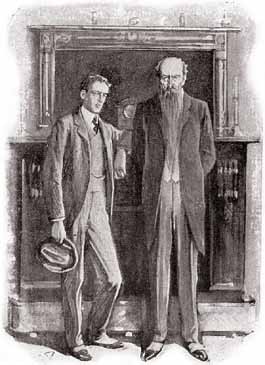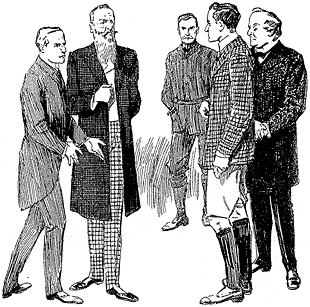| The Priory School 3 | The Priory School 4 |
That evening found us in the cold, bracing atmosphere of the Peak country, in which Dr. Huxtable’s famous school is situated. It was already dark when we reached it. A card was lying on the hall table, and the butler whispered something to his master, who turned to us with agitation in every heavy feature.
“The Duke is here,” said he. “The Duke and Mr. Wilder are in the study. Come, gentlemen, and I will introduce you.”
I was, of course, familiar with the pictures of the famous statesman, but the man himself was very different from his representation. He was a tall and stately person, scrupulously dressed, with a drawn, thin face, and a nose which was grotesquely curved and long. His complexion was of a dead pallor, which was more startling by contrast with a long, dwindling beard of vivid red, which flowed down over his white waistcoat, with his watch-chain gleaming through its fringe. Such was the stately presence who looked stonily at us from the centre of Dr. Huxtable’s hearthrug. Beside him stood a very young man, whom I understood to be Wilder, the private secretary. He was small, nervous, alert, with intelligent light-blue eyes and mobile features. It was he who at once, in an incisive and positive tone, opened the conversation.

“I called this morning, Dr. Huxtable, too late to prevent you from starting for London. I learned that your object was to invite Mr. Sherlock Holmes to undertake the conduct of this case. His Grace is surprised, Dr. Huxtable, that you should have taken such a step without consulting him.”
“When I learned that the police had failed– –”
“His Grace is by no means convinced that the police have failed.”
“But surely, Mr. Wilder– –”
“You are well aware, Dr. Huxtable, that his Grace is particularly anxious to avoid all public scandal. He prefers to take as few people as possible into his confidence.”
“The matter can be easily remedied,” said the browbeaten doctor; “Mr. Sherlock Holmes can return to London by the morning train.”
“Hardly that, Doctor, hardly that,” said Holmes, in his blandest voice. “This northern air is invigorating and pleasant, so I propose to spend a few days upon your moors, and to occupy my mind as best I may. Whether I have the shelter of your roof or of the village inn is, of course, for you to decide.”
I could see that the unfortunate doctor was in the last stage of indecision, from which he was rescued by the deep, sonorous voice of the red-bearded Duke, which boomed out like a dinner-gong.
“I agree with Mr. Wilder, Dr. Huxtable, that you would have done wisely to consult me. But since Mr. Holmes has already been taken into your confidence, it would indeed be absurd that we should not avail ourselves of his services. Far from going to the inn, Mr. Holmes, I should be pleased if you would come and stay with me at Holdernesse Hall.”
“I thank your Grace. For the purposes of my investigation, I think that it would be wiser for me to remain at the scene of the mystery.”
“Just as you like, Mr. Holmes. Any information which Mr. Wilder or I can give you is, of course, at your disposal.”
“It will probably be necessary for me to see you at the Hall,” said Holmes. “I would only ask you now, sir, whether you have formed any explanation in your own mind as to the mysterious disappearance of your son?”
“No, sir, I have not.”
“Excuse me if I allude to that which is painful to you, but I have no alternative. Do you think that the Duchess had anything to do with the matter?”
The great minister showed perceptible hesitation.
“I do not think so,” he said, at last.
“The other most obvious explanation is that the child has been kidnapped for the purpose of levying ransom. You have not had any demand of the sort?”
“No, sir.”
“One more question, your Grace. I understand that you wrote to your son upon the day when this incident occurred.”
“No, I wrote upon the day before.”
“Exactly. But he received it on that day?”
“Yes.”
“Was there anything in your letter which might have unbalanced him or induced him to take such a step?”
“No, sir, certainly not.”
“Did you post that letter yourself?”
The nobleman’s reply was interrupted by his secretary, who broke in with some heat.

“His Grace is not in the habit of posting letters himself,” said he. “This letter was laid with others upon the study table, and I myself put them in the post-bag.”
“You are sure this one was among them?”
“Yes, I observed it.”
“How many letters did your Grace write that day?”
“Twenty or thirty. I have a large correspondence. But surely this is somewhat irrelevant?”
“Not entirely,” said Holmes.
“For my own part,” the Duke continued, “I have advised the police to turn their attention to the south of France. I have already said that I do not believe that the Duchess would encourage so monstrous an action, but the lad had the most wrong-headed opinions, and it is possible that he may have fled to her, aided and abetted by this German. I think, Dr. Huxtable, that we will now return to the Hall.”
I could see that there were other questions which Holmes would have wished to put, but the nobleman’s abrupt manner showed that the interview was at an end. It was evident that to his intensely aristocratic nature this discussion of his intimate family affairs with a stranger was most abhorrent, and that he feared lest every fresh question would throw a fiercer light into the discreetly shadowed corners of his ducal history.
| The Priory School 3 | The Priory School 4 |